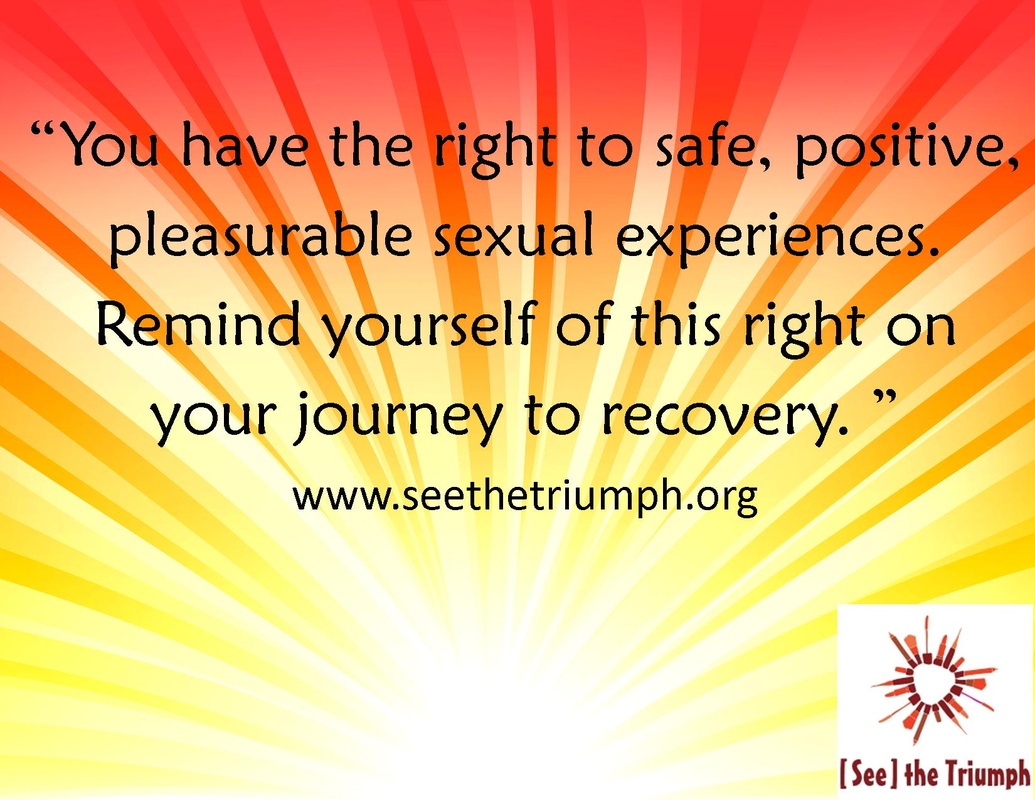|
By Christine Murray, See the Triumph Co-Founder
The World Health Organization defines sexual health in the following way: “…a state of physical, emotional, mental and social well-being in relation to sexuality; it is not merely the absence of disease, dysfunction or infirmity. Sexual health requires a positive and respectful approach to sexuality and sexual relationships, as well as the possibility of having pleasurable and safe sexual experiences, free of coercion, discrimination and violence. For sexual health to be attained and maintained, the sexual rights of all persons must be respected, protected and fulfilled.” (WHO, 2006a) I like this definition because it goes beyond viewing sexual health as simply a lack of problems, but it encompasses pleasure, satisfaction, respect, and safety. We heard from participants in our research, especially those who had experienced sexual abuse within their past abusive relationships, that a positive sense of sexuality and sexual health can be challenging to achieve in the aftermath of an abusive relationship. For example, consider the following quotes from our participants, which illustrate some of the challenges that survivors may face:
However, it’s important to also highlight that positive sexuality is possible, even in the aftermath of horrific abuse. For example, one research participant who’d been sexually abused by a former partner said, “I've started to think about myself as a stronger person. It took a long time for my self esteem to come back. I had a few years where I thought I was disgusting, and couldn't enjoy a sexual relationship.” This participant’s experience demonstrates that even after facing some initial negative sexual consequences from past abuse, it is possible to achieve a greater sense of self-esteem and enjoy a safe and healthy sexual relationship. Every person’s situation is very unique, so there are no simple rules to say how every person could recover from past abuse and achieve a positive sense of sexuality in their lives. What works for one person may be different than what works for someone else. However, the World Health Organization’s definition of sexual health supports the following four suggestions for survivors seeking to establish positive sexual health as part of recovering from a past abusive relationship: First, seek help for sexual health problems and dysfunctions. Survivors may have contracted sexually transmitted infections from their abusive partners (e.g., through their partner’s infidelity). Or, as in the first quote listed above, survivors may have injuries that make sexual activity painful or impossible. There are trained professionals who can assist survivors in understanding treatment options, include medical professionals (e.g., a gynecologist or family physician) and sex therapists (see the American Association of Sexuality Educators, Counselors, and Therapists web-site for a directory). Second, seek a respectful sexual partner who is sensitive, patient, and supportive. The World Health Organization’s definition emphasizes that sexual health “requires a positive and respectful approach,” and these are important qualities to seek in a sexual partner. Of course, it can take time to really get to know someone and know if they really meet these requirements. Survivors can therefore seek partners who are patient and understanding of their need for this time. Pressure to engage in sexual activity before you’re ready is a sign that person is not ready for a respectful, safe sexual relationship. Third, be alert for signs of coercion and abuse. The World Health Organization’s definition makes clear that freedom and individual choice are necessary for sexual health. If you come to feel that a partner does not respect your freedom to choose, or is trying to coerce you into anything you are not comfortable you are doing, know that you have the right to end that relationship. Seek partners who have good communication, ask you about your sexual preferences, openly discuss sexual questions and concerns, and listen respectfully to you when you are sharing your beliefs, values, and attitudes related to sexuality. Fourth, seek both pleasure and safety in sexual relationships. As we’ve discussed throughout this month, sexual abuse can occur within abusive relationships. These can certainly contribute to negative sexual experiences. Sexual pleasure can be absent or feel like an unattainable goal when past sexual experiences were characterized by pain, fear, disrespect, and humiliation. Again, seek professional help if you feel you’d benefit from formal support to address your sexual concerns. Note the World Health Organization’s emphasis on the sexual rights of everyone--including you. You have the right to safe, positive, pleasurable sexual experiences. Remind yourself of this right on your journey to recovery. We are constantly inspired by the stories of triumph over past abuse that we hear through the See the Triumph campaign, including our research participants and members of our community who share their stories with us. We know that sexuality can be a complicated aspect of this recovery process, but we also believe that all survivors deserve healthy sexuality and healthy relationships. We hope the resources we’ve shared throughout this month have been informative and helpful resources to support survivors toward achieving that goal. Comments are closed.
|
Archives
July 2024
CategoriesAll About Intimate Partner Violence About Intimate Partner Violence Advocacy Ambassadors Children Churches College Campuses Cultural Issues Domestic Violence Awareness Month Financial Recovery How To Help A Friend Human Rights Human-rights Immigrants International Media Overcoming Past Abuse Overcoming-past-abuse Parenting Prevention Resources For Survivors Safe Relationships Following Abuse Schools Selfcare Self-care Sexual Assault Sexuality Social Justice Social-justice Stigma Supporting Survivors Survivor Quotes Survivor-quotes Survivor Stories Teen Dating Violence Trafficking Transformative-approaches |
Search by typing & pressing enter



 RSS Feed
RSS Feed